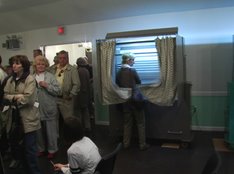
As usual, the BBC is doing the best coverage of the US elections. This is a brilliant quote by Arkansas Senator Blanche Lincoln from a BBC radio piece that aired this morning. She manages to say absolutely nothing, while pretending to be simple and profound.
"You build a levee around your rice field as it floods, and then you walk that rice levee," she says. "You don't run down the levee because if you run... you bust the levee."
And what do you do when you get all the way round?
"You walk it again."
Monday, May 17, 2010
How to pretend to say something
Thursday, May 13, 2010
Branding and the Ownership Society

I was trying to figure out why Justine's post and comments made me angry.
Lots of things make me angry, and not always for obvious reasons. What she says is true, you have to write about things "you are genuinely passionate about."
Authors have always done this. Shakespeare, Voltaire, Shaw, Chekhov, Pinter, Joe Orton, David Hare, Eudora Welty, Claude Brown, Kurt Vonnegut, Zora Neale Hurston... passionate, relevant, honest.
That is not a brand.
A brand is a vibe and image that are developed, usually in conjunction with an advertising agency to promote a company and it's products. It often involves
- a logo (sometimes one powerful enough to become a sigil)
- a print and television ad campaign
- a celebrity
- a slogan "Just Do It"
- sometimes a song
To say that "Corporations can't control the message anymore" is not accurate. They have a message and they are controlling it. There's a reason why the public option for healthcare isn't in the healthcare legislation, even though polls show most people in the U.S. want it.
In a recent NPR interview, small boutique publishers said the number of times you have to catch someone's attention now for them to remember you is not 3, but 9.
We are all being told now that the internet has changed everything, and it has. But are we really being honest about what is has changed? In some ways it's like the presenting the concept of not having government run health care as the "Ownership society." You don't have to deal with all that bureaucracy any more. Now you start a savings account and pay for all your own medical costs. You "own" it.
You "Own" your career and your brand and your content. But what it really means is that you (with your computer and whatever resources you can muster) are competing with huge mega-corporations for the attention of an increasingly overwhelmed public. And it's best to be realistic about what the results of this David and Goliath competition are going to be for most artists.
I have independently produced a music CD called "a raw, eclectic tour de force" by Gotham Magazine and a documentary film that won Best Documentary at the Sunscreen 2008 Film Festival and screened at the Harvard Kennedy School of Government. I am proud of the work I've done, but I spent the last 2 years clearing out tens of thousands of dollars in debt, and recovering from Chronic Fatigue Syndrome.
This new idea that we are the brand, the brand is us and all we have to do is put it out there and rewards will follow is naive. We are competing on a non-level playing field, and the extra collateral that indies put up is in 80 hour weeks, credit card debt, and the sometimes daily frustration that somehow we are still not measuring up.
Wednesday, May 12, 2010
Private vs. Public

I've been reading a lot of information about developing a personal brand and maintaining an online presence. Like this one that embraces the branding process as an expression of one's inner soul. I think there is only so much "rebranding" a word can take before it becomes double-speak in the 1984 sense. The word brand is a part of a corporate vocabulary that has been used for decades to communicate a strong public image usually developed by a company's leadership in conjunction with an advertising agency. For people to now begin to use this word to mean "an expression of your soul" is a stretch.
For one thing, the internet is not the place where one can truly bare one's soul safely. Because prospective employers and colleagues will use my blog as a reference, I can't write for example about the dreams I had the last 2 nights about my mother, although it is something deep and speaks to issues I am wrestling with. The internet can rarely substitute for the private journal. It is a public sphere and even when it seems to be expressing honest and personal passions, how much is real, and how much is for "branding purposes?" We do so much in public we begin to lose track of what is real and what we create for the brand. Like Warren Beatty asking Madonna in "Truth or Dare" - Is it worth doing if it's not on camera?
I find an inverse relationship between how much time I spend online and how much writing/real work I actually get accomplished. I understand maintaining an online presence is a professional necessity, and yes hopefully one expresses oneself honestly, well, and on meaningful subjects. But I don't think it can be confused or substituted for the process of inner exploration and the development of a world that the writer or any artist must engage in.
